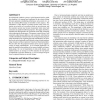Free Online Productivity Tools
i2Speak
i2Symbol
i2OCR
iTex2Img
iWeb2Print
iWeb2Shot
i2Type
iPdf2Split
iPdf2Merge
i2Bopomofo
i2Arabic
i2Style
i2Image
i2PDF
iLatex2Rtf
Sci2ools
131
click to vote
ICCAD
2009
IEEE
2009
IEEE
Scheduling with soft constraints
In a behavioral synthesis system, a typical approach used to guide the scheduler is to impose hard constraints on the relative timing between operations considering performance, area, power, etc., so that the resulting RTL design is favorable in these aspects. The mechanism is often flawed in practice because many such constraints are actually soft constraints which are not necessary, and the constraint system may become inconsistent when many hard constraints are added for different purposes. This paper describes a scheduler that distinguishes soft constraints from hard constraints when exploring the design space. We propose a special class of soft constraints called integer-difference soft constraints, which lead to a totally unimodular constraint matrix in an integer linear programming formulation. By exploiting the total unimodularity, the problem can be solved optimally and efficiently using a linear programming relaxation without expensive branch and bound procedures. We also sh...
Design | Hard Constraints | Hardware | ICCAD 2009 | Soft Constraint |
Related Content
| Added | 18 Feb 2011 |
| Updated | 18 Feb 2011 |
| Type | Journal |
| Year | 2009 |
| Where | ICCAD |
| Authors | Jason Cong, Bin Liu, Zhiru Zhang |
Comments (0)

